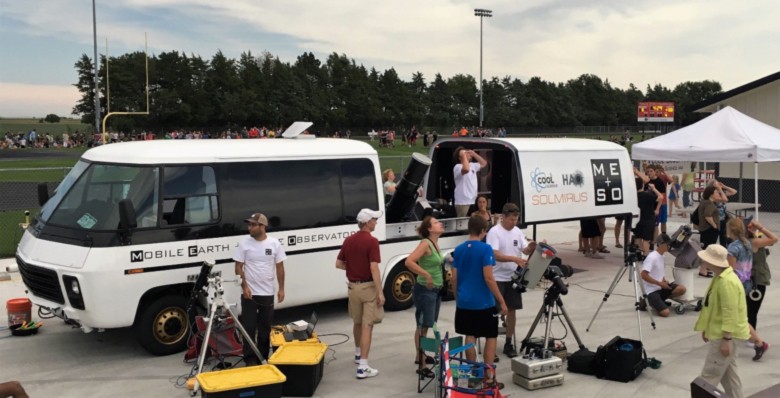OMS to host ‘Importance of Water’ program

ALAMOSA — The Mobile Earth + Space Observatory (MESO) is coming to Ortega Middle School in November to present an environmental education program on “The Importance of Water,” thanks to a grant from the Environmental Protection Agency.
MESO, a science center on wheels, will be parked at the middle school for the week of November 11-16, providing an assembly program and inquiry-based classroom activities for the school’s sixth grade students.
Students will interact with scientist educators from the National Space Science & Technology Institute (NSSTI) as they explore topics and engage in learning that augments the school’s curriculum on the water cycle, watersheds, water purification, and water conservation. After school, MESO staff will be available for students to further explore Earth & space science using telescopes and other scientific instruments.
The week-long program, called Puddle Palooza, will begin with a community science festival for the families and neighbors to experience and celebrate The Importance of Water, previewing highlights of what the students will engage in during the week.
Puddle Palooza will kick off Sunday afternoon from 2–5:30 p.m., when the MESO team and representatives from community organizations will be available to provide informative, interactive activities around local water issues. From 5:30-8 p.m., the MESO telescope will be available to the public, allowing students’ families and friends and local residents to participate in celestial observing (weather permitting).
This visit has been a year in the making, as Ortega Middle School Assistant Principal Eric Palmer and sixth grade science teachers Deborah Shawcroft and Deysha Simpson have coordinated with the NSSTI staff to integrate MESO with the schools’ bell schedule and sixth grade curriculum.
Their objective is to engage the students in scientific inquiry to allow students to experience first-hand what it is to be a scientist. They also want to engage the broader community in the opening event highlighting the week-long focus on water, and let the students see how issues relating to water impact life in Alamosa and the world.
“The program is designed to reach students who might not otherwise have access to the scientists and scientific instrumentation provided by the MESO,” said Robert Sallee, Chairman of the NSSTI Board of Directors. “We want to engage and excite students, and motivate them to pursue additional education in science, technology, engineering and math (STEM) subjects leading to careers in the technology workforce.”
“This project will engage middle school students in learning and research in vital environmental issues relating to our Colorado water supplies with emphasis on community-based concerns,” Sallee said. “The educational programs have been created to be consistent with Colorado science education standards and build upon curricula and activities currently in place.”
Ortega Middle School is one of five schools across Colorado selected to participate in this program, which is being piloted to verify the efficacy of the mobile STEM lab as a vehicle for motivating students to learn and do research in the Earth and space sciences.
Recognizing that many schools do not have the financial resources to acquire sophisticated scientific equipment or transport students to Colorado Springs or Denver on STEM-related field trips, NSSTI is awarding each school a $4,550 sub-grant to fund purchase of scientific instrumentation needed to support on-going student research, cover costs of participating in this project, and fund other STEM-education initiatives.
Last June, Ortega Middle School staff attended professional development at Metropolitan State University and were trained to guide their students in collecting scientific data on a regular basis for entry into an international database managed by the Global Learning and Observations to Benefit the Environment (GLOBE) program.
Also, NSSTI is providing Ortega teachers with the opportunity to involve their classes in a distance learning program that connects them via computer to scientists who can discuss the relevance of what they are studying to the lives and wellbeing of people in Alamosa and surrounding communities.
Dimitri Klebe, PhD, NSSTI president and principal investigator for this project, said the goals of the project are to increase student and community understanding and appreciation of the importance of hydrological systems in their communities; how these systems are affected by human influences and climate change; and how these hydro-logical systems fit into the global picture. This will promote environmental stewardship and increase everyone’s capacity for informed decision-making about water issues.
“We are bringing together scientist-educators and community organizations to resource teachers and students to do actual research around local community water concerns,” Klebe said. “As a result, students will see the applicability of science to their communities and to regional, national, and international concerns,” Klebe said.
To learn more, visit www.nssti.org or contact: [email protected].



